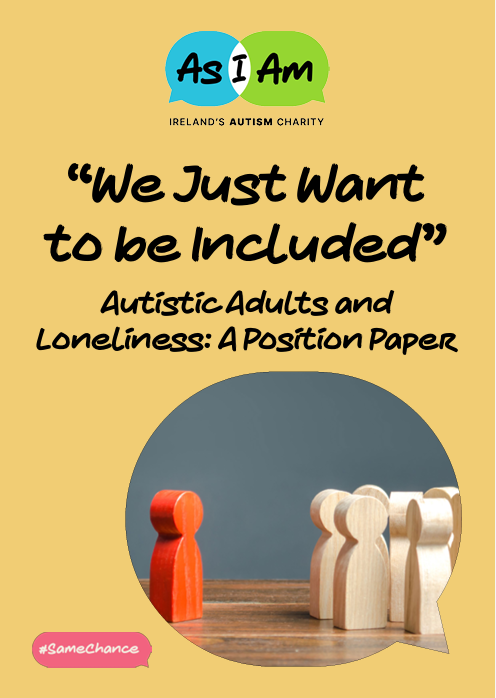 What is Autism?
What is Autism?
74% say they must hide their true selves to be accepted – AsIAm urges immediate government action to address exclusion
AsIAm, Ireland’s Autism Charity, has launched a position paper titled “We Just Want to Be Included”, highlighting the pervasive and enduring impact of loneliness on Autistic adults across the country. The report, based on a survey of over 300 Autistic adults, presents a stark picture of exclusion, masking, and unmet needs.
Among the key findings:
• 55% of Autistic adults feel lonely all or most of the time – nearly three times the national average.
• 69% feel left out of society, and 95% say being Autistic is a driving factor in their experience of loneliness.
• 74% feel they must mask or change who they are to be accepted.
• 63% say there are no social activities in their area that match their interests.
The report highlights the unique barriers Autistic adults face in forming friendships and being included in community life – from inaccessible social spaces and limited public transport, to a widespread lack of understanding of Autism and communication differences.
Loneliness
The report states that, “Loneliness is not necessarily about being alone. Instead, it is the perception of being alone and isolated that matters most and is a state of mind.” The report also highlights that, “Autistic people are interested in social connections and relationships with other people, but they often experience loneliness more often and more intensely than non-Autistic people.”
One respondent featured in the report defined loneliness from the Autistic perspective as “Sadness, missing out on experiences and watching others form strong bonds that you know you will never have.”
This lived reality is reflected in the testimonies and survey data, showing that loneliness for Autistic adults is often shaped by exclusion, misunderstanding, and a lack of accessible spaces to connect with others.
Research
The findings are based on a national survey conducted by AsIAm in January 2025. Over 321 responses were gathered from Autistic adults, with 91% completing the survey independently. The anonymous format allowed participants to share their experiences freely and honestly, helping AsIAm identify clear themes and recommendations.
Commenting on the report, Adam Harris, CEO of AsIAm said:
“Loneliness is not simply about being alone – it stems from not feeling accepted or understood. This report clearly highlights that many Autistic people in Ireland continue to feel excluded from their communities and often feel compelled to mask their true selves in order to navigate daily life. This report highlights the importance of ensuring that the Autism Innovation Strategy is fully implemented and resourced to meet the needs of the Autistic community in Ireland and we would call for budget 2026 to reflect this need”
One Autistic adult featured in this report commented that “The majority of the world is not Autistic, so I am expected to mould myself to presenting as non-Autistic in order to have any acceptance or inclusion. This comes at a considerable cost”
The report outlines 16 key recommendations, including:
• The creation of a national loneliness strategy that specifically addresses Autistic adults.
• Legislative backing for the Autism Innovation Strategy.
• Greater investment in community-based, Autism-friendly social supports.
• A grant scheme for local initiatives tackling social exclusion.
• Expanded access to personal supports, transport, and inclusive public spaces.
The report concludes that loneliness should be treated as a public health and human rights issue – one that requires long-term, cross-departmental action in line with the UN Convention on the Rights of Persons with Disabilities (UNCRPD).
“We must work toward a society where Autistic individuals are included as a matter of course,” Harris said. “This is not about requiring Autistic people to adapt to societal norms, but about reshaping those norms to recognise and respect Autistic people”